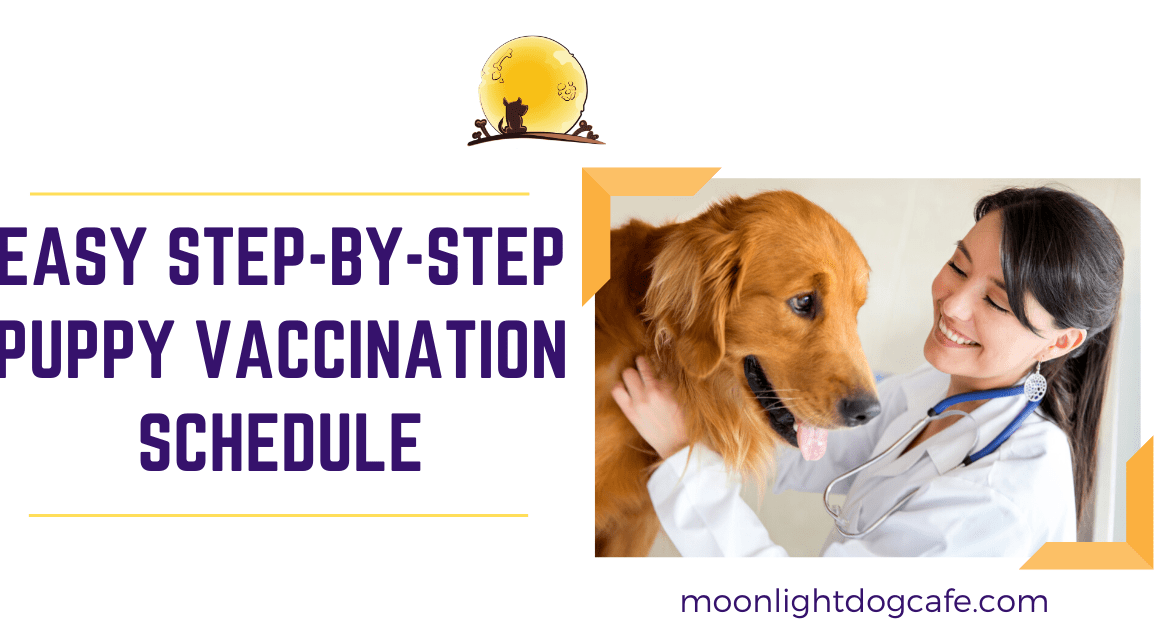
What You Need to Know About Dog Vaccinations: The Ultimate Puppy & Dog Vaccination Schedule in Canada
Essential Dog Vaccinations: What Your Puppy Needs to Stay Healthy
For new dog owners, we understand that having a new dog or puppy is overwhelming. Ensuring the health and well-being of your furry friend is a top priority for any pet owner. Vaccinations play a crucial role in protecting dogs from various infectious diseases. However, as awareness of holistic pet care grows, many pet parents are seeking a more balanced approach. A holistic perspective on dog vaccinations emphasizes the importance of immunization but also the overall health and lifestyle.
Holistic pet care aims to support the body’s natural defenses through optimal nutrition, minimal exposure to toxins, and mindful vaccination schedules. This approach advocates for necessary vaccines while being cautious of over-vaccination. Over-vaccination can potentially lead to adverse effects and compromised immune systems.
In this blog, we will explore the essential vaccines for dogs, guided by holistic principles. We will discuss which vaccines are crucial for your dog’s health and how to tailor a vaccination schedule to your dog. By understanding the holistic approach to vaccinations, you can make informed decisions that prioritize your dog’s overall wellness and longevity.
Core and Non-Core Dog Vaccines: Understanding the Differences (quick printable infographic)
Core Dog Vaccines (Recommended for All Dogs)
Core dog vaccines protect against diseases so dangerous or widespread that they’re considered essential, regardless of your dog’s lifestyle. These include:

- Canine Distemper (CDV),
- Canine Parvovirus (CPV- 2),
- Canine Adenovirus (CAV-2, which provides cross protection against CAV-1) and
- Rabies.
These are highly contagious viral diseases with some being fatal.
- Canine Distemper (CDV), Canine Parvovirus (CPV- 2), Canine Adenovirus (CAV-2) are spread directly through contaminated feces, urine or indirectly through the air.
- Rabies is primarily spread to dogs through a bite.
Non-Core Dog Vaccines (Your Choice)
Non-core dog vaccines are chosen selectively, depending on your dog’s exposure risk, travel, boarding habits, or geographic factors. Examples include:
- Bordetella (kennel cough),
- Parainfluenza,
- Leptospirosis,
- Lyme disease etc.
These are typically bacterial based diseases. Always discuss non-core options with your veterinarian to balance risk vs benefit for your dog. Things to consider include:
- Even with your dog vaccinated for Bordetella, it may still get kennel cough from a wide variety of bacteria and virus. We’ve got a blog on how to resolve kennel cough.
- Leptospirosis for dogs can be transferred to humans (zoonotic) and can be picked up from bacteria in water, contaminated soil affected by urine. More likely in rural areas if your dog spends time near water.
- Lyme disease is transmitted by ticks.
- Non-core dog vaccines provide only short-term immunity and are sometimes ineffective against an evolved strain of bacteria.
- Getting non-core vaccines is a judgment call based on a conversation with your vet.
Are Dog Vaccinations Required by Law in Canada? What You Should Know
With the exception of rabies in a few Canadian provinces, there is no legal requirement to vaccinate your dog. For example, the Province of Ontario mandates this under Regulation 567. The other vaccines (such as distemper, parvovirus, leptospirosis) have no nationwide legal requirement, though they are strongly recommended by veterinary associations.
However, for a new puppy, it is essential to have core dog vaccines. Vaccination after your puppy’s maternal antibodies wear out is critical to:
- keeping your dog healthy
- preventing the spread of disease to dog and humans.
If your dog travels to the U.S., the Centers for Disease Control and Prevention’s new requirements (effective August 1 2024) state that dogs arriving from low-risk or rabies-free countries (like Canada) only need the CDC Dog Import Form — though proof of rabies vaccination may still be required depending on the destination U.S. state.
Despite there being no legal requirement for dog vaccination other than for rabies, there is still a health reason to vaccinate your puppy.
Canadian Province Highlights on Dog Vaccine Requirements
| Province / Territory | Legal Vaccination Requirement for Dogs | Notes / Source |
|---|---|---|
| Ontario (ON) | Rabies vaccination required for dogs/cats/ferrets 3 months of age or older. | O. Reg. 567/ 1990 mandates rabies immunization. |
| British Columbia (BC) | No province-wide law found for mandatory dog vaccines beyond standard public health import/travel rules. | Local bylaws may vary; no clear province-wide requirement. |
| Alberta (AB) | No identified province-wide law requiring core dog vaccination (rabies or others) in the sources reviewed. | Owners should check municipal/municipal licensing bylaws. |
| Quebec (QC) | No province-wide statute found in reviewed sources that explicitly mandates core dog vaccinations beyond public health/travel rules. | Municipal regulations may apply. |
| Saskatchewan, Manitoba, Atlantic Territories / NWT / Yukon / Nunavut | No specific province-wide law identified in the sources reviewed requiring dog vaccinations universally (beyond import/travel) | Varies widely; local municipality may impose licensing/vaccination requirements. |
Animal Rabies Statistics in Canada
We’ve been keeping track of rabies cases in animals including dogs and cats across Canada since 2015. Here are a few trends we see holding true based on data from Canada Food Inspection Agency.
- From 2015 to 2021, bats were the primary animal affected by rabies and the potential carrier for rabies in Canada.
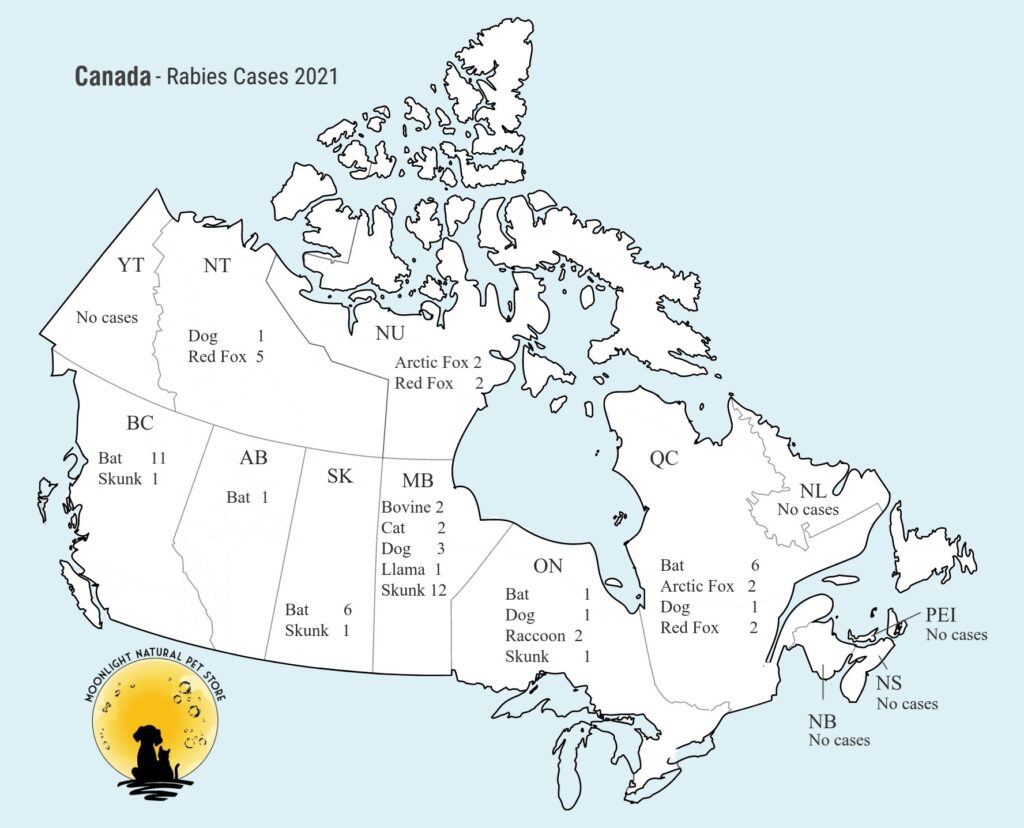
- The trend for British Columbia still seems to be holding the same with rabies cases highest in bats. Please make sure you report any bat bites or scratches to your animal or yourself if you go camping or hiking. Unfortunately, a man was bitten on Vancouver Island and passed away. This is a serious disease so please don’t take any chances after you come into physical contact with a bat in Canada.
- For the other provinces, Manitoba, Saskatchewan and Quebec seem to be the only provinces that have dogs contract rabies every year.
- Manitoba also tends to record cat rabies while other provinces do not seem to have rabies transmitted to household pets.
How Long Are Dog Vaccines Effective?
Here is a snapshot of a Vet expert Dr. Schultz’s research results. Here are a few things to keep in mind to understand this chart:
- A Challenge study in assessing vaccines refers to exposing/injecting the animal to the actual disease and observing whether they develop the disease.
- Serology study refers to measuring antibody production in the blood in response to a disease.
- Note that these results do not mean that all vaccinated dogs will be immune for the period of time listed. These are just benchmarks meaning that a dog can be immune for shorter, equal or longer times.
- In the case of challenge study, it meant that 97% of dogs were immune to the disease after the listed time period.
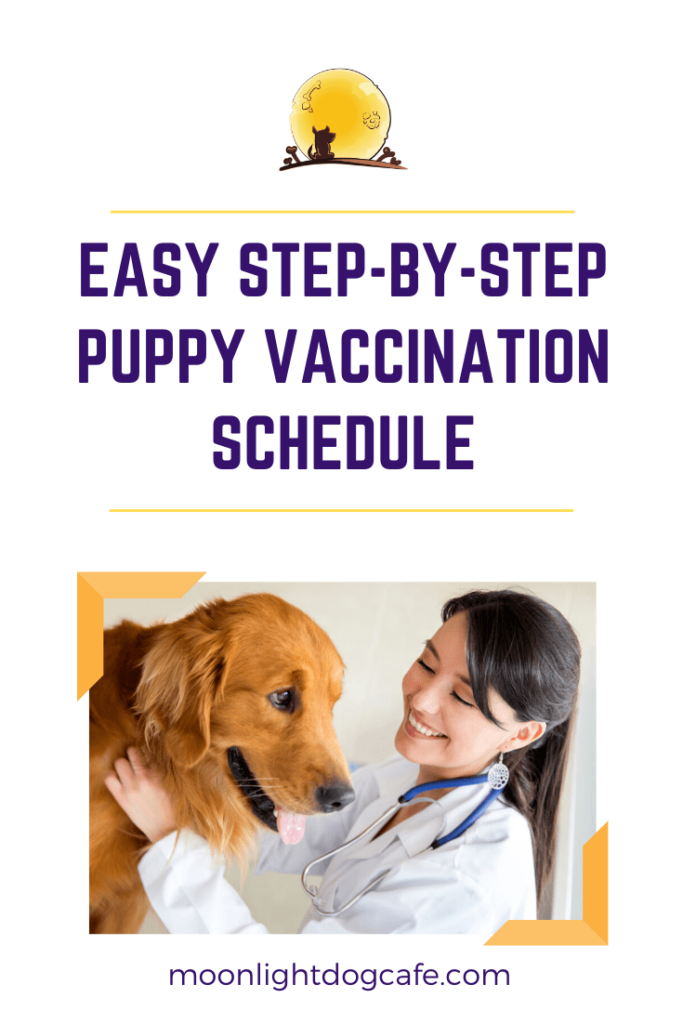
A Holistic Vet’s Puppy Vaccination Schedule Canada (by weeks)
- Do not bundle non-core vaccines with the core vaccines as this may be taxing on your dog’s system.
- 9-10 weeks old – 1st round of Canine Distemper (CDV), Canine Parvovirus (CPV- 2), Canine Adenovirus (CAV-2)
- Do not start a puppy on core vaccination before 6 to 8 weeks of age. The reason is that puppies still have maternal antibodies, which are compromised by pet vaccinations at that early age.
- At least 4 weeks after – 2nd round of Canine Distemper (CDV), Canine Parvo (CPV- 2), Canine Adenovirus (CAV-2)
- During the 1st year of vaccinations, consider the next set of vaccination no more frequently than every 4 weeks.
- Another 4 weeks to 3rd round of shots or for some who want to titer, wait only 2 weeks after 2nd round of vaccinations to check if the dog is immunized.
- So what if you did the titer testing instead on the 3rd visit just to find out that you need the shot anyway. That is a question that pet owners would have to decide for themselves.
- > 6 months old – According to our vet, talk to your vet about having the rabies shot done after your pup is older than 6 months. And then every 3 years depending on which Canadian province you live in. Alternatively you can have titer tests done. Ontario requires the rabies vaccine.
Adult & Senior Dog Vaccination Recommendations
We used to receive letters from our vet about Shinji getting annual vaccinations. Thankfully, the letter stated that you could either get the shots for Parvovirus in dogs, Distemper, Adenovirus or have him checked by alternative means.
- Our vet recognized that annual dog vaccinations are not necessary and offered alternative means.
- Most vets agree that both dogs and cats need annual check ups.
- Typically, pet parents are more likely to go visit the vet if they believe they have to do vaccinations.
- Schedule an annual check up with your pet if you can afford it. Usually, we’d recommend a blood work done so that you know how healthy your pet is.
- Based on the chart above, you can titre your dog every few years or revaccinate your dog when he/she is at least 5 years old, after the initial vaccinations in Year 1.
- A vet we spoke to, suggested talking to your vet to get the rabies shots done every 3 years or alternatively having titer tests depending on the law.
- Rabies titers are more expensive with a vet quoting $250. Compared to the rabies vaccination cost, the titer cost is twice the amount. Note that both prices include vet consultation fees.
Cost of Dog Vaccines in Canada
Here are some of the costs of dog vaccines we found by calling around vet offices in Vancouver and the ones who were willing to provide that informatio.
- You probably could get a package of shots Canine Distemper (CDV), Canine Parvo (CPV- 2), Canine Adenovirus (CAV-2) including Bordetella, Leptospirosis and vet exams for about $125.
- The titer cost would be about $70 for Canine Distemper (CDV), Canine Parvo (CPV- 2), Canine Adenovirus (CAV-2).
- Typically, we’ve seen DAPPV shot, a combination vaccine for distemper virus, adenovirus type 1 and 2, canine parainfluenza virus and canine parvovirus cost between $40 and $55.
- Bordetella shot or the nasal vaccine can range from $25 to $35.
- A Lyme vaccine would be about $30.
- On a side note, fecal tests and blood tests are a good idea during vet checkups and those are about $200 including the vet fees.
How Often Should You Vaccinate Your Dog? Vet Experts Weigh In
The frequency of dog vaccinations is important. There is always the likelihood that there are adverse effects when your puppy or dog gets vaccinated. According to Dr. Ron Schultz annual vaccination “provides no demonstrable benefit and may increase the risk of adverse reactions.”
Potential Side Effects of Annual/ Over Vaccination
Dog vaccines can cause adverse reactions from hair loss, lethargy, allergies, to seizures and chronic issues in some cases. Our dog, Shinji developed food sensitivities as well environmental allergies due to over-vaccination by his first vet in Ontario.
Here is the direct quote on adverse reactions from Dr. Schultz’s website: “While there may be immediate hypersensitivity reactions, other acute events tend to occur 24-72 hours afterwards, or up to 45 days later in the case of delayed reactions.”
Dog Vaccine Potential Side Effects (quick printable infographic)
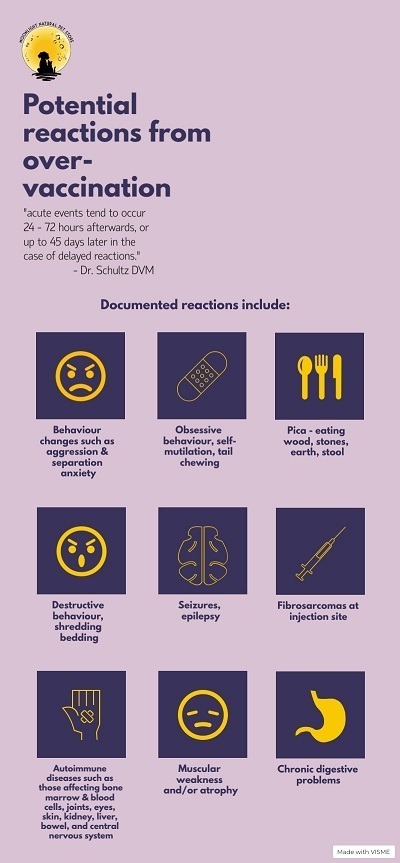
Dog Vaccine Safety, Reactions & Risk Management
Common Mild Reactions
After dog vaccination, it’s normal for pups or adults to show minor reactions:
- Soreness or swelling around injection site
- Temporary lethargy
- Loss of appetite
- Mild fever lasting 24–48 hours
For mild reactions, 2 holistic vets we’ve spoken to recommend using thuja which can be found in Adored Beast Anti-Vaccinosis.
Rare But Serious Dog Vaccine Risks
Severe allergies, swelling, or systemic reactions are rare but possible. If your dog shows sudden swelling, difficulty breathing, vomiting, or collapse soon after vaccination, that’s an emergency. Go to the vet.
Sensitive Dogs & Small Breeds
Some small or sensitive dogs may have a slightly higher risk of vaccine reaction. Many veterinarians now space non-core vaccines 2+ weeks apart from core vaccines for high-risk dogs.
Monitoring & Reporting
If you suspect a vaccine-related adverse event, report it to your veterinarian, the vaccine manufacturer, or relevant regulatory agencies. Keep your vet informed of any prior reactions.
Puppy Vaccination & Adult Dog Vaccination FAQs
How many vaccines does my puppy need?
Typically a puppy receives a series of core vaccinations at 6–8, 10–12 and 14–16 weeks, with a booster at one year; exact timing depends on breed, maternal antibodies and region. Holistic vaccintion schedules are slightly different with later starts and titer testing around the 3rd round to see if there are antibodies.
Is the rabies vaccine required in Canada?
Rabies regulations vary by province and municipality. Rabies vaccination is required for travel and often strongly recommended; check local public health. Ontario may have the only province-wide mandate to vaccinate for rabies.
Can dog vaccines cause side effects?
Yes. It is possible. Typically, minor symptoms include soreness or loss of appetite. Severe allergies, swelling, or systemic reactions are rare but possible. If your dog shows sudden swelling, difficulty breathing, vomiting, or collapse soon after vaccination, that’s an emergency. Go to the vet.
What is a titer test for dogs?
A titer measures antibody levels; in some cases it can guide revaccination decisions. Discuss costs and interpretation with your vet.
This guide was originally reviewed by vet Dr. Rehanni. Please comment to let us know what you think about this guide?


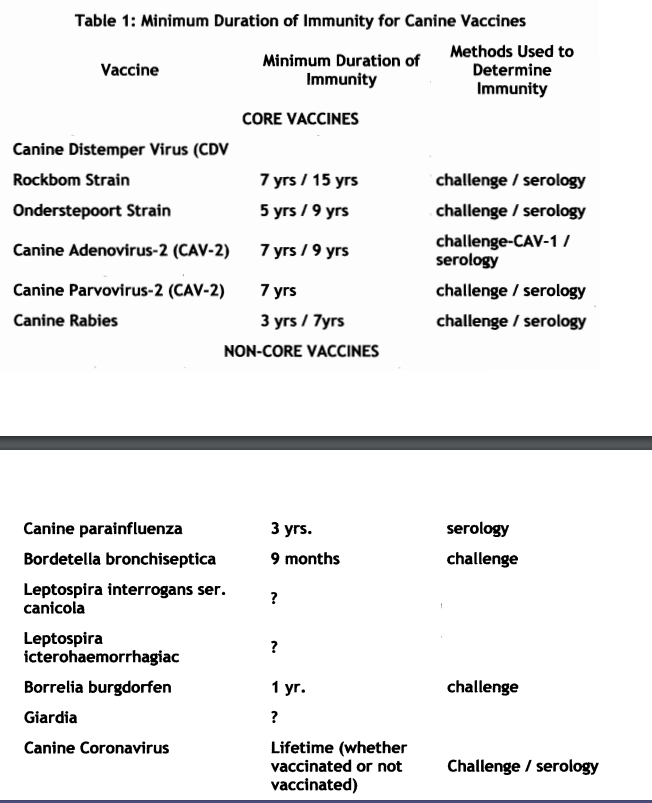
[…] not over-vaccinate your pets. More pet vaccines are not better. For more information see Dr Shultz (expert in vaccinations […]
[…] are not guaranteeing protection for your dog by getting the vaccine. Bordetella is not one of the Core Vaccines, we’ve talked about in the past and in addition, there may be side effects. An active […]
[…] not over-vaccinate your pets. More pet vaccines are not better. For more information see Dr Shultz (expert in vaccinations […]
[…] not over-vaccinate your pets. More pet vaccines are not better. For more information see Dr Shultz (expert in vaccinations […]
can you define the term “challenge” used in table 1? Thank you!
Hi Maggi, challenge would mean testing the virus on an immunized animal (cat or dog) to see if the antibodies from prior immunization block the replication of the virus. Serology would mean measuring blood antibody levels.
Is the rabies vaccine legally required in BC?
Hi Leanne,
It is not legally required in BC. It is in Ontario and if you are crossing the border into the USA, you’ll be required to certify that your pet has been vaccinated for rabies.
Also many dog groomers here in BC request proof of rabies shots before they will take your dog.
Rabies vaccine has not been required for dogs entering the USA from Canada since Jan. 2019. CDC has updated requirements on their website.
That is great! We went to check and dogs coming from Canada no longer need rabies certification. Just an oral statement that “the dogs lived in a country with low or no risk for at least 6 months or since birth.” Thank you for the update.
How long should you wait until you introduce your puppy to other dogs? After first vaccine or later?
Hi Artur, we’d recommend that you introduce your dog after the 2nd set of shots. This is because you would typically titer to see if the dog has antibodies after the 2nd set of shots. This approach is a balance between being prudent about your dog’s health and ensuring that your dog is socialized and you don’t have behavioural problems.